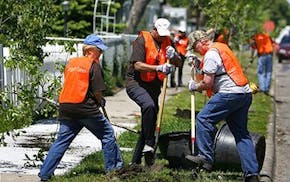For Lara Mueller, it kicks in at the same time every week, like clockwork.
"Sunday just has this sad feeling to it, after about 5 p.m.," said the St. Louis Park resident. "There is a sort of umbrella hanging over the evening."
She tries to buoy herself, buying a few "goodies" at the grocery store, making plans for midweek. Still, every Sunday evening, when she thinks about "the stress of the week, the busy-ness of the week," she feels her mood descend.
What Mueller suffers from isn't debilitating or particularly new. Austrian psychotherapist Viktor Frankl coined the phrase "Sunday night blues" in 1946. But it is real, and surprisingly widespread — affecting schoolkids, office workers, even recent retirees.
The symptoms, said Golden Valley-based psychologist Jenna Bemis, can include "a sense of dread that the fun of weekend is coming to an end, a sense of anxiety about … the pressure of the workweek that is soon to return and a yearning to prolong the weekend in order to spend time as we wish."
Whether our nonstop schedules, our embrace of technology or the economy have upped the ante, the growing prevalence of the Sunday blues signals a change of heart about our day of rest.
"We have less time on Sundays dedicated to doing what we want to do now," said Bemis. "There's more time devoted to paid work, housework, running errands, child care, and less time devoted to personal care, socializing and free time."
In fact, Bemis, who has studied the malaise, notes that "positive feelings peaked on Sunday afternoons" in the mid-1980s. But by 2003, "Sunday afternoons were marked by an emotional downturn."
Her findings are echoed in a recent Monsters.Com poll of 3,619 people, which found that 78 percent of adults around the world experience some degree of late-Sunday doldrums. In the United States, 59 percent of respondents said they have a "really bad" dose.
Bemis attributes the down-grading of Sunday not only to our warp-speed lifestyles: She also lays the blame on loss of connection.
"Even just a few decades ago, Sundays represented more family time, family meals and worship," she said. "Today, there is less time focused on meals and connecting with family members."
From school to work
Generations of teens have set themselves up for the Sunday doldrums by putting off homework assignments until the last minute. But for today's students, there's "a bigger combination of things going on," said Cheryl Meger, dean of Lakeville North High School.
"We have put together this whole big package we want kids to do: work and volunteer work and activities and athletics," Meger said. "So they get to Sunday evening and they've been to their job and a basketball tournament and everything else. Sometimes you wonder if we've overdone it with them."
Young adults like Mueller, 27, who are entering the workforce after the Great Recession, also face fresh challenges.
"For someone in their 20s trying to find their career path, my jobs have sometimes been less than perfect," said Mueller, "making Sunday nights that much harder when Monday is around the corner and a job that you are not thrilled about is waiting for you."
People of any age who have mundane, unchallenging jobs have legitimate reasons to sing the Sunday blues, said Fran Sepler, owner/president of Sepler & Associates, a Minneapolis human-resources firm.
"If you're in that pure utility relationship with your job — just go to get a paycheck, suck it up and get it done — the contrast with the weekend (when you can sleep in and be with friends) with work (where you have no control) is the most significant and profound."
Creating support systems
Some companies have taken heed, Sepler said, and refrain from scheduling major meetings on Friday afternoons and Monday mornings. Some take pains to frequently measure their employees' engagement and, when possible, give workers more control over their hours.
Financial service companies, in particular, "are doing a lot to get people engaged," Sepler said, and many multinational companies have been strongly committed to enhancing employee engagement.
"Having the flexibility to work from home on Monday morning and come in later, or just spending less time at work seems to improve the way people feel," Sepler said. "Otherwise they might get to feeling like they're on a little gerbil wheel."
While school administrators haven't altered schedules, some have beefed up support programs for students and their families to address stress and anxiety, said Meger.
Even those who work on Sundays have noticed the phenomenon.
Among them: the Rev. Bill Bohline Hosanna! Lutheran Church, who recently delivered a series of sermons based on his book "It's Sunday, But Monday's Comin'," which addresses the disparity between the day of worship and the rest of the week, when the "good news" message fades.
Many of his 6,000-plus parishioners leave the Lake-ville church Sunday morning "filled up with a sense of connection and a renewal for the coming week," he said. "But realities set in, and even as people of faith, we can get caught up in circumstances. And quite often that affects our outlook and mood, and it can do that powerfully."
Light and loss
That sinking feeling might be felt more forcefully by certain types of people and at certain times of year.
Those prone to anxiety "experience a more active dread," Sepler said. And ultra-organized folks "who want things perfectly arranged might be a little more prone to anxiety," Meger surmised.
Early darkness could contribute, as well. A poll in Britain, where the winter days are even shorter than here, pegged the onset of Sunday sadness at 4:13 p.m.
Meger, for one, thinks there's a seasonal spike. "That sunshine means something to all of us," she said. "We also miss not being able to be in the outdoors, not going out and throwing the football or just going for a walk."
But just going for a walk isn't likely to cure the blues. What Bemis recommends is hopping on tasks rather than procrastinating, planning activities early in the week so you have something to look forward to and allowing yourself some unplugged time.
Pastor Bohline calls for an attitude adjustment.
"The reality is that we control very little in our lives," he said. "I do have choice in the workplace about my attitude, to see myself as a contributor not a victim. I have gifts I can bring. But as soon as I'm focused only on me, the victim mentality, it goes wrong."
Don't be counting on a quick cure, however. For most people who have them, the Sunday night blues tend to fade slowly over time.
"I suffered from it for years," said former teacher Steve Phillipps of Edina. "It took being retired over a year before I would stop feeling depressed Sunday nights."
Bill Ward • 612-673-7643

Yuen: Why do people forgive? It's messy, complex and 'the best form of self-interest'

Hark, downtown Minneapolis' only vegan, gluten-free cafe, closing April 28

Critics' picks: The 12 best things to do and see in the Twin Cities this week
How the Goo Goo Dolls learned the music biz from Minneapolis bands

